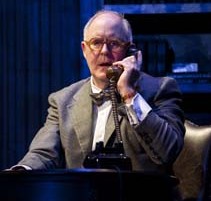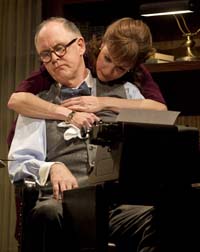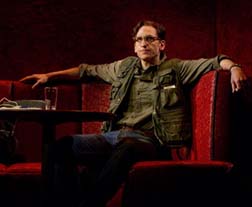By Lucy Komisar

John Lithgow is perfectly cast as Joseph Alsop, the venomous, fanatically anti-communist newspaper columnist who built a career off his access and influence with U.S. presidents and politicians. But as David Auburn’s play shows, he was not a garden variety right-winger. Auburn (Proof) adds depth and subtlety to the character by highlighting his contradictions. He had the courage to oppose the vicious Senator Joseph McCarthy, though it’s not clear here why.
And there’s more about this complicated character’s hidden life than readers knew at the time, his heyday of the 1950s and 60s. Alsop was not only a closet gay, but he had a tryst with a young Moscow tour leader in what turned out to be a photo set up by the KGB. Neither the U.S. government nor American journalists took the bait.

Such a lifestyle was quite unacceptable in Washington of the time. Ironically, as the Washington power scene was often conducted at dinner parties with powerful Senators, cabinet members and government officials as guests, Alsop needed a show wife and hostess. He made a marriage deal with Susan Mary Jay (Margaret Colin, who reminds us vividly, sadly, of what such women were (are?) like), a widow from a rich, well-connected family that traced its lineage to John Jay, the first chief justice of the U.S. Supreme Court. Her snobbery and desire to be at the center of things must have matched his. He yells at her – if Lithgow‘s portrayal is correct, Alsop found it hard to talk without yelling or sneering — that her task will be to sit at the head of the table and be fascinated by the person on her right.
More than anything, Lithgow’s Alsop is obnoxious and a martinet, fawning to those who were powerful and blistering to those he considered his social inferiors.
My favorite line is when Alsop, excited at the glamour to come, says that JFK will make the town interesting. Kennedy is Veuve Cliquot and a starlet on each arm, and one of them has a degree from the Sorbonne. So, perhaps Alsop knew about Kennedy’s sexual secrets as well.

We see Alsop driven by the war in Vietnam, furious at critical American reporters, phoning James Reston, associate editor of the New York Times, to get him to fire a fierce truth-teller about the war, David Halberstam (an eerily correct Stephen Kunke). Reston hangs up on him. Alsop rails against the reportorial crusade against the Vietnam government. He pressed Lyndon Johnson for escalation.
Director Daniel Sullivan brings out the immediacy of these developments so they could be happening today. In fact, maybe they could. Just change Vietnam to Iraq and Afghanistan. It‘s especially true regarding what was said (lies) by the top generals versus the assertions (truths) of military of lesser rank and more street-smarts. Plus Òa change.
The show marriage to Susan lasted 12 years. Margaret Colin does not show a great range of feeling. But maybe that is what Susan was like. The oddest part in the play is where she expresses a desire for physical affection and tells Alsop she thought he would change (his homosexuality). She couldn’t have been that dumb! Alsop ripostes, Through your feminine wiles? Lithgow exudes Alsop’s obnoxious nastiness.
This is not a great play. It’s sometimes a bit talky and occasionally it feels contrived. But it is always fascinating.
The Columnist. Written by David Auburn; directed by Daniel Sullivan. Manhattan Theatre Club at Samuel J. Friedman Theatre, 261 West 47th Street, New York. 212-239-6200; . Opened April 25, 2012; closes July 8, 2012.
Also on NY Theatre-Wire.

